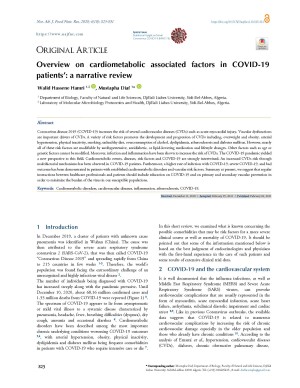Overview on cardiometabolic associated factors in COVID-19 patients: a narrative review
Abstract
Coronavirus disease 2019 (COVID-19) increases the risk of several cardiovascular diseases (CVDs) such as acute myocardial injury. Vascular dysfunctions are important drivers of CVDs. A variety of risk factors promotes the development and progression of CVDs including, overweight and obesity, arterial hypertension, physical inactivity, smoking, unhealthy diet, overconsumption of alcohol, dyslipidemia, atherosclerosis and diabetes mellitus. However, nearly all of these risk factors are modifiable by antihypertensive, antidiabetic, or lipid-lowering medication and lifestyle changes. Others such as age or genetic factors cannot be modified. Moreover, infection and inflammation have been shown to increase the risk of CVDs. The COVID-19 pandemic yielded a new perspective to this field. Cardiometabolic events, diseases, risk factors and COVID-19 are strongly intertwined. An increased CVDs risk through multifactorial mechanisms has been observed in COVID-19 patients. Furthermore, a higher rate of infection with COVID-19, severe COVID-19, and bad outcome has been demonstrated in patients with established cardiometabolic disorders and vascular risk factors. Summary at present, we suggest that regular interactions between healthcare professionals and patients should include education on COVID-19 and on primary and secondary vascular prevention in order to minimize the burden of the virus in our susceptible populations.
Full text article
Authors
Copyright (c) 2020 Authors

This work is licensed under a Creative Commons Attribution 4.0 International License.
-
Attribution — You must give appropriate credit, provide a link to the license, and indicate if changes were made. You may do so in any reasonable manner, but not in any way that suggests the licensor endorses you or your use.
-
No additional restrictions — You may not apply legal terms or technological measures that legally restrict others from doing anything the license permits.





